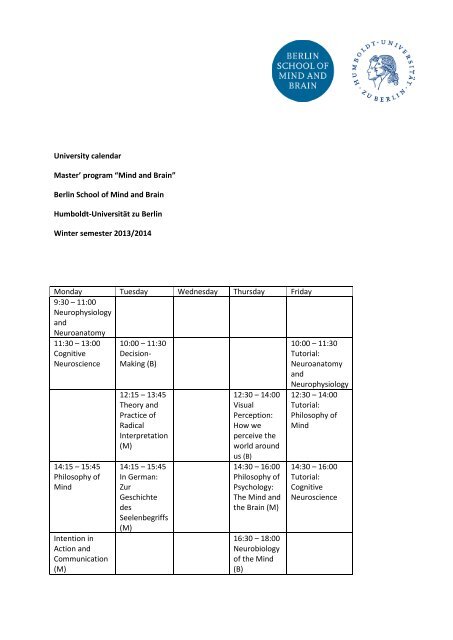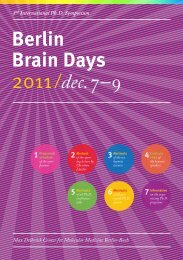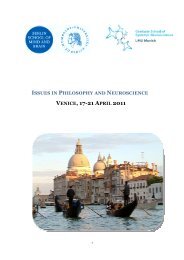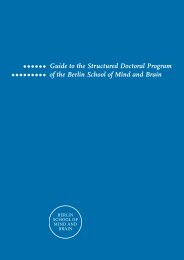University calendar Master' program - Berlin School of Mind and Brain
University calendar Master' program - Berlin School of Mind and Brain
University calendar Master' program - Berlin School of Mind and Brain
Create successful ePaper yourself
Turn your PDF publications into a flip-book with our unique Google optimized e-Paper software.
<strong>University</strong> <strong>calendar</strong><br />
Master’ <strong>program</strong> “<strong>Mind</strong> <strong>and</strong> <strong>Brain</strong>”<br />
<strong>Berlin</strong> <strong>School</strong> <strong>of</strong> <strong>Mind</strong> <strong>and</strong> <strong>Brain</strong><br />
Humboldt-Universität zu <strong>Berlin</strong><br />
Winter semester 2013/2014<br />
Monday Tuesday Wednesday Thursday Friday<br />
9:30 – 11:00<br />
Neurophysiology<br />
<strong>and</strong><br />
Neuroanatomy<br />
11:30 – 13:00<br />
Cognitive<br />
Neuroscience<br />
14:15 – 15:45<br />
Philosophy <strong>of</strong><br />
<strong>Mind</strong><br />
Intention in<br />
Action <strong>and</strong><br />
Communication<br />
(M)<br />
10:00 – 11:30<br />
Decision-<br />
Making (B)<br />
12:15 – 13:45<br />
Theory <strong>and</strong><br />
Practice <strong>of</strong><br />
Radical<br />
Interpretation<br />
(M)<br />
14:15 – 15:45<br />
In German:<br />
Zur<br />
Geschichte<br />
des<br />
Seelenbegriffs<br />
(M)<br />
12:30 – 14:00<br />
Visual<br />
Perception:<br />
How we<br />
perceive the<br />
world around<br />
us (B)<br />
14:30 – 16:00<br />
Philosophy <strong>of</strong><br />
Psychology:<br />
The <strong>Mind</strong> <strong>and</strong><br />
the <strong>Brain</strong> (M)<br />
16:30 – 18:00<br />
Neurobiology<br />
<strong>of</strong> the <strong>Mind</strong><br />
(B)<br />
10:00 – 11:30<br />
Tutorial:<br />
Neuroanatomy<br />
<strong>and</strong><br />
Neurophysiology<br />
12:30 – 14:00<br />
Tutorial:<br />
Philosophy <strong>of</strong><br />
<strong>Mind</strong><br />
14:30 – 16:00<br />
Tutorial:<br />
Cognitive<br />
Neuroscience
Comprehensive Course Calendar<br />
M<strong>and</strong>atory Lectures:<br />
Monday 9:30 – 11:00 start: 21.10.2013<br />
Neurophysiology <strong>and</strong> Neuroanatomy<br />
Pr<strong>of</strong>. Dr. Arno Villringer (MPI Human Cognitive <strong>and</strong> <strong>Brain</strong> Sciences), Dr. Derek Ott (Institut für<br />
Diagnostik der Epilepsien) et. al.<br />
Alte Nervenklinik, Bonhoefferweg 2 (Studenteneingang), Charité Campus Mitte, Seminarraum Ebene<br />
3<br />
The course provides a basic underst<strong>and</strong>ing <strong>of</strong> where (anatomy) in the brain what (physiology)<br />
happens. It is <strong>of</strong> particular value for those students whose background is mainly in a “mind” science<br />
such as linguistics or philosophy. Participating students will learn about the fundamental units <strong>of</strong><br />
brain anatomy, such as lobes, areas, columns, etc. A special emphasis will be put on structure<br />
function relationship, i.e., which brain area is responsible for which aspect <strong>of</strong> brain function. It will be<br />
explained how brain areas interact, <strong>and</strong> what theories exist about bringing together aspects <strong>of</strong><br />
information from different brain areas into one percept or thought (binding). The physiology part <strong>of</strong><br />
the course will address fundamentals <strong>of</strong> neuronal functioning, interaction <strong>of</strong> neurons,<br />
neurotransmission, <strong>and</strong> will provide an underst<strong>and</strong>ing <strong>of</strong> neurovascular coupling, a basis <strong>of</strong> the most<br />
important functional neuroimaging method, fMRI.<br />
Monday 11:30 -13:00 start: 21.10.2013<br />
Cognitive Neuroscience<br />
Pr<strong>of</strong>. Dr. Niko Busch (Charité – Universitätsmedizin <strong>Berlin</strong>)<br />
Alte Nervenklinik, Bonhoefferweg 2 (Studenteneingang), Charité Campus Mitte, Seminarraum Ebene<br />
3<br />
The course provides an introduction to the field <strong>of</strong> Cognitive Neuroscience which is the study <strong>of</strong> the<br />
neural basis <strong>of</strong> perception, cognition, <strong>and</strong> behavior in the intact human brain. The course will cover<br />
core topics in Cognitive Neuroscience, including typical experimental paradigms <strong>and</strong> research<br />
methods. In addition to presenting "accepted knowledge", I will emphasize current debates in<br />
Cognitive Neuroscience to illustrate how controversies are moving the field forward. The course<br />
comprises lectures <strong>and</strong> discussions.<br />
A light introduction to Cognitive Neuroscience for beginners:<br />
Ward. The student’s guide to cognitive neuroscience. Psychology Press, 2nd edition, 2010.
A more in-depth text book:<br />
Purves. Principles <strong>of</strong> cognitive neuroscience. Sinauer Associates, 2nd edition, 2012.<br />
Monday 14:15 – 15:45 start: 21.10.2013<br />
Basic Philosophical Concepts <strong>and</strong> Philosophy <strong>of</strong> <strong>Mind</strong><br />
Pr<strong>of</strong>. Dr. Michael Pauen (Institute <strong>of</strong> Philosophy, HU <strong>Berlin</strong>)<br />
Bernstein Center for Computational Neuroscience, Philippstr. 13, 10115 <strong>Berlin</strong>, Lecture Room<br />
The course provides a systematic overview over the most central issues in the philosophy <strong>of</strong> mind.<br />
Participating students will learn to apply relevant philosophical concepts, they will be taught to<br />
construct a valid argument; they will learn how to distinguish between the most important options in<br />
the mind–body debate <strong>and</strong> how to assess the consequences <strong>of</strong> neuroscientific research.<br />
Teaching Week in Febuary:<br />
17 to 21 Febuary 2014<br />
Ethics <strong>and</strong> Neuroscience<br />
Pr<strong>of</strong>. Dr. Thomas Schmidt (Institute for Philosophy, HU <strong>Berlin</strong>)<br />
location: Campus Nord, Haus 4 (Ostertag-Haus), Lecture hall 4=Room No 111, 1st floor<br />
Participants will be familiarized with basic ethical concepts <strong>and</strong> theories <strong>and</strong> will gain an overview <strong>of</strong><br />
ethically-relevant aspects <strong>of</strong> neuroscience. Thereby, participants will learn to know how ethical issues<br />
are tackled in philosophical ethics, <strong>and</strong> they will get an overall view <strong>of</strong> the theoretical interfaces<br />
between ethics <strong>and</strong> neuroscience.<br />
The course provides an introduction to central notions <strong>and</strong> theories discussed in philosophical ethics<br />
<strong>and</strong> an overview <strong>of</strong> ethical issues in neuroscience as well as <strong>of</strong> consequences neuroscience does or<br />
might have for ethics.<br />
M<strong>and</strong>atory Tutorials:<br />
Friday 10:00 – 11:30 start: 25.10.2013<br />
Tutorial Neurophysiology <strong>and</strong> Neuroanatomy:<br />
Dr. Veronika Witte (Charité – Universitätsmedizin <strong>Berlin</strong>)<br />
Invalidenstraße 110, 10115 <strong>Berlin</strong>, room 449
Friday 12:30 – 14:00 start: 25.10.2013<br />
Tutorial: Philosophy <strong>of</strong> <strong>Mind</strong><br />
Felix Bräuer M.A. (Institute for Philosophy, HU <strong>Berlin</strong>)<br />
Invalidenstraße 110, 10115 <strong>Berlin</strong>, room 449<br />
Friday 14:30 – 16:00 start: 18.10.2013<br />
Tutorial: Cognitive Neuroscience:<br />
Dr. Flavia Filimon (Max Planck Institute for Human Development, <strong>Berlin</strong>)<br />
Invalidenstraße 110, 10115 <strong>Berlin</strong>, room 449<br />
Elective Courses:<br />
Focus MIND<br />
Monday 16:15 – 17:45 start: 21.10.2013<br />
Intention in Action <strong>and</strong> Communication<br />
Dr. Richard Moore (Institute <strong>of</strong> Philosophy, HU <strong>Berlin</strong>)<br />
Sophienstraße 22 a, 10178 <strong>Berlin</strong>, room 4.11<br />
Intention, along with belief <strong>and</strong> desire, is one <strong>of</strong> the ingredients <strong>of</strong> folk psychology to which we<br />
appeal in explaining behaviour. Its relationship to purposive action makes it central to human life.<br />
But what are intentions? And how do they figure in the life <strong>of</strong> the mind?<br />
The latter question has become particularly important in recent years, because cognitive scientists<br />
have argued that certain varieties <strong>of</strong> intentional behaviour are both uniquely human, <strong>and</strong> play a<br />
foundational role in human cognitive development. For example, Tomasello <strong>and</strong> colleagues have<br />
argued that humans but not great apes are capable <strong>of</strong> joint action, in which participants work<br />
together to achieve shared goals; <strong>and</strong> that joint action explains various aspects <strong>of</strong> children’s cognitive<br />
development. Tomasello also argues that humans but not apes act with Gricean communicative<br />
intentions. These statements turn on the idea that intentions can be cognitively complex – but this<br />
makes empirical claims difficult to evaluate independently <strong>of</strong> an account <strong>of</strong> how intentions figure in<br />
mental life.<br />
In this course, we will study three classic sources <strong>of</strong> work on intentional action: Elizabeth Anscombe’s<br />
Intention, Paul Grice’s paper ‘Meaning’, <strong>and</strong> a series <strong>of</strong> papers by Michael Bratman on the nature <strong>of</strong>
joint action. We’ll also discuss empirical work on intention possession <strong>and</strong> attribution in human<br />
children <strong>and</strong> non-human great apes <strong>and</strong>, time permitting, work on the neuroscience <strong>of</strong> intention.<br />
This cours will be evaluated by a combination <strong>of</strong> (i) a class presentation on one <strong>of</strong> the papers or book<br />
sections to be discussed, <strong>and</strong> (ii) a submitted course paper. Presentation topics will be decided in the<br />
first meeting <strong>of</strong> the semester. The subject <strong>of</strong> the paper should be decided with me before writing<br />
commences.<br />
For the most up-to-date reading lists for this course, please check my homepage:<br />
https://sites.google.com/site/richardmoorecogsci/home/teaching. Revised versions <strong>of</strong> the syllabi for<br />
all <strong>of</strong> my courses will be posted there at the end <strong>of</strong> the first week <strong>of</strong> September.<br />
Background reading:<br />
Dennett, D. (1971). Intentional systems. Journal <strong>of</strong> Philosophy, 68: 87-106.<br />
Core readings:<br />
Anscombe, G. E. M. (1957). Intention. Harvard UP.<br />
Bratman, M. (1999). Faces <strong>of</strong> Intention. Cambridge UP.<br />
Grice, P. (1957). ‘Meaning’. Reprinted in Studies in the Way <strong>of</strong> Words. Harvard UP.<br />
Tomasello, M., Carpenter, M., Call, J., Behne, T., & Moll, H. (2005). Underst<strong>and</strong>ing <strong>and</strong> sharing<br />
intentions: The origins <strong>of</strong> cultural cognition. Behavioral <strong>and</strong> <strong>Brain</strong> Sciences, 28: 675-735.<br />
Tuesday 12:15 – 13:45 start: 15.10.2013<br />
Theory <strong>and</strong> Practice <strong>of</strong> Radical Interpretation<br />
Dr. Richard Moore (Institute <strong>of</strong> Philosophy, HU <strong>Berlin</strong>)<br />
Dorotheenstraße 24, 10117 <strong>Berlin</strong>, room 1.406<br />
On what basis do we attribute mental states to others? An intuitive answer is that we take others’<br />
utterances to be revelatory <strong>of</strong> their thoughts, <strong>and</strong> so acquire knowledge <strong>of</strong> their minds through<br />
knowledge <strong>of</strong> their verbal behaviour. However, Donald Davidson argued that when we fail to share a<br />
common language with those whose behaviour we would interpret, a potentially vicious circle forms:<br />
we can’t underst<strong>and</strong> their mental states without knowing the language that they speak; but we can’t<br />
acquire knowledge <strong>of</strong> this language without knowledge <strong>of</strong> the mental states that their utterances<br />
express.<br />
To remedy this problem, Davidson argues that we can interpret the utterances <strong>of</strong> others by using a<br />
theory <strong>of</strong> interpretation, which enables the systematic mapping <strong>of</strong> utterances to their truth<br />
conditions. However, this method requires the use <strong>of</strong> a ‘Principle <strong>of</strong> Charity’ – whereby the Radical<br />
Interpreter makes best sense <strong>of</strong> others’ utterances by interpreting them as being maximally<br />
consistent with what she would be given to say in identical circumstances. This principle may<br />
therefore be unsuitable in cases where similarity between interpreter <strong>and</strong> the target <strong>of</strong><br />
interpretation cannot be taken for granted.<br />
By way <strong>of</strong> exploring possible limitations <strong>of</strong> Davidson’s theory – not least, in the form <strong>of</strong> Davidson’s<br />
claim that only those who speak can think – we’ll consider it in the context <strong>of</strong> on-going efforts by<br />
comparative psychologists <strong>and</strong> biologists to interpret the vocal <strong>and</strong> gestural utterances <strong>of</strong> wild <strong>and</strong><br />
semi-wild chimpanzees. This course will therefore serve as an introduction both to some key ideas in
the philosophy <strong>of</strong> language <strong>and</strong> communication, <strong>and</strong> to the use <strong>of</strong> comparative psychology <strong>and</strong><br />
ethology as methods for coming to underst<strong>and</strong> the minds <strong>of</strong> others.<br />
We’ll also briefly discuss three philosophical approaches to our knowledge <strong>of</strong> other minds as they<br />
bear on these issues: Expressive Communication, which argues that some mental states in humans<br />
<strong>and</strong> non-human animals can be directly perceived, <strong>and</strong> ‘Theory’ <strong>and</strong> ‘Simulation’ Theories <strong>of</strong> our<br />
knowledge <strong>of</strong> other minds.<br />
This cours will be evaluated by a combination <strong>of</strong> (i) a class presentation on one <strong>of</strong> the papers or book<br />
sections to be discussed, <strong>and</strong> (ii) a submitted course paper. Presentation topics will be decided in the<br />
first meeting <strong>of</strong> the semester. The subject <strong>of</strong> the paper should be decided with me before writing<br />
commences.<br />
For the most up-to-date reading lists for this course, please check my homepage:<br />
https://sites.google.com/site/richardmoorecogsci/home/teaching. Revised versions <strong>of</strong> the syllabi for<br />
all <strong>of</strong> my courses will be posted there at the end <strong>of</strong> the first week <strong>of</strong> September.<br />
Some light background reading:<br />
Everett, D. (2008). Don’t Sleep, There Are Snakes: Life <strong>and</strong> Language in the Amazonian Jungle.<br />
London: Pr<strong>of</strong>ile.<br />
Goodall, J. (1971). In the Shadow <strong>of</strong> Man. London: Collins.<br />
Core philosophical readings:<br />
Davidson, D. (1973). Radical interpretation.<br />
-- (1974). Belief <strong>and</strong> the basis <strong>of</strong> meaning.<br />
-- (1974). On the very idea <strong>of</strong> a conceptual scheme.<br />
-- (1975). Thought <strong>and</strong> talk.<br />
All reprinted in Davidson (1984) Inquiries Into Truth <strong>and</strong> Interpretation. Oxford: OUP.<br />
Tuesday 14:15 - 15:45 ^ start: 15.10.2013<br />
Zur Geschichte des Seelenbegriffs (in German)<br />
Pr<strong>of</strong>. Dr. Michael Pauen (Institute for Philosophy, HU <strong>Berlin</strong>)<br />
Dorotheenstraße 24, 10117 <strong>Berlin</strong>, room 1.406<br />
Das Interesse an Problemen des Bewusstseins lässt sich bis auf die ältesten Dokumente unserer<br />
Kultur zurückverfolgen. Die Begriffe, in denen sich dieses Interesse ausdrückt, haben sich allerdings<br />
fundamental gew<strong>and</strong>elt: Wo heute von Bewusstsein gesprochen wird, war früher vom Geist bzw. der<br />
Seele die Rede. Das Seminar wird nicht nur den begrifflichen W<strong>and</strong>el verfolgen, sondern auch den<br />
Ursachen und den weitreichenden Konsequenzen dieses W<strong>and</strong>els nachgehen, der bis heute anhält.<br />
Literatur<br />
Hinterhuber, Hartmann. Die Seele. Natur- und Kulturgeschichte von Psyche, Geist und Bewusstsein.<br />
Wien: Springer 2001.
Jüttemann, Gerd u.a. Die Seele. Ihre Geschichte im Abendl<strong>and</strong>. Weinheim: Psychologie Verlags-Union<br />
2001.<br />
Pauen, Michael. Was ist der Mensch? Die Entdeckung der Natur des Geistes. München: DVA 2007.<br />
Thursday 14:30 – 16:00 start: 24.102013<br />
Philosophy <strong>of</strong> Psychology: The <strong>Mind</strong> <strong>and</strong> the <strong>Brain</strong><br />
Dr. Michal Klincewicz (<strong>Berlin</strong> <strong>School</strong> <strong>of</strong> <strong>Mind</strong> <strong>and</strong> <strong>Brain</strong>)<br />
Invalidenstraße 110, 10115 <strong>Berlin</strong>, room 449<br />
In this course we will examine the systematic relationship between the concerns <strong>of</strong> philosophy <strong>and</strong><br />
psychology. We will discuss commonsense psychology, cognitive science, <strong>and</strong> neuroscience <strong>and</strong><br />
explore how they inform each other. We will also compare the relative merits <strong>and</strong> disadvantages <strong>of</strong><br />
these approaches <strong>and</strong> explore how they can bear on various philosophical issues. As far as it is<br />
possible, we will not discuss the relationship between the mind <strong>and</strong> body, the other minds problem,<br />
free will, or other metaphysical or epistemological issues that would fit better in a course on the<br />
philosophy <strong>of</strong> mind. Ultimately, our goal is to come away with a philosophically informed<br />
underst<strong>and</strong>ing <strong>of</strong> psychological inquiry <strong>and</strong> a better underst<strong>and</strong>ing <strong>of</strong> contemporary philosophical<br />
inquiry into the nature <strong>of</strong> mind.<br />
In this course we will examine the systematic relationship between the concerns <strong>of</strong> philosophy <strong>and</strong><br />
psychology. We will discuss commonsense psychology, cognitive science, <strong>and</strong> neuroscience <strong>and</strong><br />
explore how they inform each other. We will also compare the relative merits <strong>and</strong> disadvantages <strong>of</strong><br />
these approaches <strong>and</strong> explore how they can bear on various philosophical issues. As far as it is<br />
possible, we will not discuss the relationship between the mind <strong>and</strong> body, the other minds problem,<br />
free will, or other metaphysical or epistemological issues that would fit better in a course on the<br />
philosophy <strong>of</strong> mind. Ultimately, our goal is to come away with a philosophically informed<br />
underst<strong>and</strong>ing <strong>of</strong> psychological inquiry <strong>and</strong> a better underst<strong>and</strong>ing <strong>of</strong> contemporary philosophical<br />
inquiry into the nature <strong>of</strong> mind.
Focus BRAIN<br />
Tuesday 10:00 – 11:30 start: 22.10.2013<br />
Decision-Making<br />
Dr. Vera Ludwig (<strong>Berlin</strong> <strong>School</strong> <strong>of</strong> <strong>Mind</strong> <strong>and</strong> <strong>Brain</strong>)<br />
Invalidenstraße 110, 10115 <strong>Berlin</strong>, room 449<br />
Every day we make hundreds <strong>of</strong> decisions, ranging from relatively easy ones, such as what to eat for<br />
breakfast, to very difficult ones, such as whether to move to another city for a new job.<br />
In this seminar, students will explore decision-making from a broad range <strong>of</strong> perspective, with a focus<br />
on neuroscientific aspects. What heuristics do people use when they make decisions? What<br />
mechanisms in the brain underlie decision-making? What role do emotions <strong>and</strong> intuitions play? Why<br />
is it that people with addictions keep on deciding to consume a drug despite knowing the negative<br />
consequences? And do neuroscientific findings really suggest that we cannot decide freely?<br />
Students will learn about key theories <strong>and</strong> ideas in the field <strong>of</strong> decision-making, such as expected<br />
utility theory, prospect theory, drift-diffusion models, the somatic marker hypothesis, <strong>and</strong> the<br />
distinction between ‘liking’ <strong>and</strong> ‘wanting’. Recent studies will be introduced, particularly regarding<br />
the neural basis <strong>of</strong> decision-making. This will allow students to learn about important findings,<br />
methods, <strong>and</strong> open questions in decision-making research. Finally, students will critically discuss the<br />
usefulness <strong>and</strong> potential philosophical implications <strong>of</strong> neuroscientific findings concerning decisionmaking<br />
with regard to the idea <strong>of</strong> “neuromarketing” <strong>and</strong> freedom <strong>of</strong> the will.<br />
Literature<br />
Rangel, A., Camerer, C., & Montague, P. R. (2008). A framework for studying the neurobiology <strong>of</strong><br />
value-based decision making. Nature Reviews Neuroscience, 9(7), 545-556.<br />
Thursday 12:30 – 14:00 start: 24.10.2013<br />
Dr. Sébastien Crouzet (<strong>Berlin</strong> <strong>School</strong> <strong>of</strong> <strong>Mind</strong> <strong>and</strong> <strong>Brain</strong>)<br />
Visual perception: How we perceive the world around us<br />
Invalidenstraße 110, 10115 <strong>Berlin</strong>, room 449<br />
We see, feel, hear, touch <strong>and</strong> smell effortlessly, whereas other mental functions like language <strong>and</strong><br />
memory seem much more elaborated <strong>and</strong> complex. But the fact that sensory processing seems easy<br />
is actually extraordinary. Indeed, computers are much faster <strong>and</strong> more efficient than us on<br />
apparently complex tasks, such as evaluating the square root <strong>of</strong> 10. But when it comes to the visual<br />
recognition <strong>of</strong> objects in the real-world, a 3-year-old can outperform the most sophisticated<br />
algorithms available today.
In this class, we will introduce the current hypotheses about the psychological <strong>and</strong> neuroscientific<br />
underpinnings <strong>of</strong> visual perception. We will first surf the neural activity wave down the visual system:<br />
from the transduction <strong>of</strong> light into neural signal interpretable by the cortex, to the transformations<br />
occuring at each level <strong>of</strong> the visual cortical hierarchy. An emphasis will be placed on the nature <strong>of</strong> the<br />
visual representation (gr<strong>and</strong>-mother cell vs. population coding theories). From there, we will cover<br />
various topics such as the effect <strong>of</strong> attention (on behavior <strong>and</strong> on the underlying neural signal), the<br />
visual search paradigm <strong>and</strong> computational models <strong>of</strong> object recognition in natural scenes.<br />
Thursday 16:30 – 18:00 start: 24.10.2013<br />
Neurobiology <strong>of</strong> the mind:<br />
Cellular <strong>and</strong> molecular basis <strong>of</strong> cognition <strong>and</strong> mental illness<br />
Dr. Simon Jacob (Charité – Universitätsmedizin <strong>Berlin</strong>)<br />
Invalidenstraße 110, 10115 <strong>Berlin</strong>, room 449<br />
What is the stuff memories are made <strong>of</strong>? What are the neuronal mechanisms that enable us to learn<br />
<strong>and</strong> recall information? Can electrical currents in single neurons give rise to how we perceive <strong>and</strong><br />
attend to our environment, how we think, feel <strong>and</strong> act?<br />
In this course, students will explore the biological basis <strong>of</strong> selected topics in cognitive neuroscience<br />
including sensation <strong>and</strong> perception, attention, learning <strong>and</strong> memory, emotions <strong>and</strong> language. The<br />
focus <strong>of</strong> this course is on the neuronal mechanisms that give rise to these functions, covering<br />
processes at the level <strong>of</strong> intracellular molecules <strong>and</strong> small electrical currents up to individual neurons<br />
<strong>and</strong> ultimately networks <strong>of</strong> neurons.<br />
Each session <strong>of</strong> this course will comprise a lecture by the instructor on a particular cognitive function<br />
as well as the presentation <strong>of</strong> a l<strong>and</strong>mark original research paper by students. In this way, the course<br />
will convey textbook knowledge supplemented by illustrations <strong>of</strong> important research techniques <strong>and</strong><br />
current questions in the neurobiology <strong>of</strong> cognition.<br />
Equipped with this knowledge, students will also explore how malfunctions in these elaborate<br />
neuronal systems give rise to mental illnesses that affected e.g. the politician Ronald Reagan, the<br />
novelist Ernest Hemingway <strong>and</strong> the mathematician John Nash (“A Beautiful <strong>Mind</strong>”). Upon completing<br />
the course, students will have an underst<strong>and</strong>ing <strong>of</strong> the molecular, cellular <strong>and</strong> systems neurobiology<br />
<strong>of</strong> higher cognitive functions <strong>and</strong> be able to name important hypotheses concerning the causes <strong>of</strong><br />
major neuropsychiatric disorders.<br />
Literature:<br />
Principles <strong>of</strong> Neural Science, eds. E. K<strong>and</strong>el, J. Schwartz, T. Jessel, S. Siegelbaum, A. Hudspeth, 5 th<br />
edition, 2012<br />
The Cognitive Neurosciences, ed. Michael Gazzaniga, 4 th edition, 2009<br />
Neurobiology <strong>of</strong> Mental Illness, eds. D. Charney, J. Buxbaum, P. Sklar, E. Nestler, 4 th edition, 2013
If you have questions, please contact<br />
Dr Dirk Mende<br />
mb-education@hu-berlin.de<br />
+49 (0)30 2093 -1792





